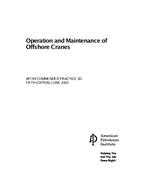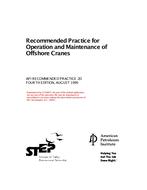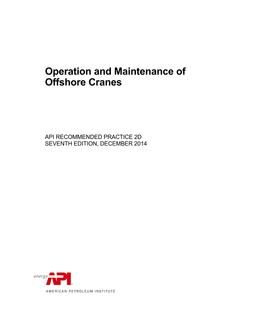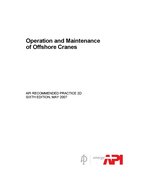Click here to purchase
This recommended practice establishes general principles for the safe operation and maintenance of offshore pedestal-mounted revolving cranes on fixed or floating offshore platforms, offshore support vessels, jackup drilling rigs, semi-submersible drilling rigs and other types of mobile offshore drilling units (MODUs). This document also provides requirements and recommendations for personnel training, lift planning, pre-use inspection, and testing of temporary cranes that are erected offshore.
Typical applications can include, but are not limited to the following.
a)Offshore oil exploration and production applications; these cranes are typically mounted on a fixed (bottom-supported) structure, floating platform structure, or ship-hulled vessel used in drilling and production operations for offshore minerals and energy.
b)Shipboard applications; these lifting devices (rated for 10,000 lbs [4536 kg] or more) are mounted on surface-type vessels and are used to move materials, containers, ROVs, diving bells, pipeline, subsea components, and other materials on the vessel, between vessels, into the sea, or to the sea bed.
c)Heavy-lift applications; cranes for heavy-lift applications are mounted on barges, self-elevating vessels or other vessels, and are used in construction and salvage operations above and below the sea surface.
Equipment (e.g. davits, launch frames) used only for launching life-saving appliances (life boats or life rafts) are not included in the scope of this recommended practice.
Lifting devices not covered by this document should be operated, inspected, and maintained in accordance with the manufacturer’s recommendations.
Product Details
- Edition:
- 7th
- Published:
- 12/01/2014
- Number of Pages:
- 120
- File Size:
- 1 file , 3.4 MB
- Product Code(s):
- G02D07, G02D07, G02D07
- Note:
- This product is unavailable in Cuba, Iran, North Korea, Syria



